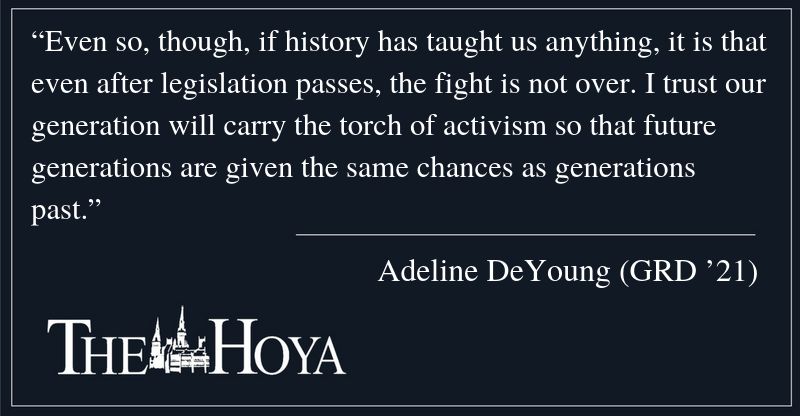Young people continue to be catalysts for change, this time on the issue of climate.
In the 1960s, students were conducting sit-ins to protest segregation and marching to speak out against the Vietnam War. Young people took it upon themselves to tell older generations they weren’t okay with the status quo and demanded action. Today, young people are telling that same activist generation that our generation is not okay with the status quo and demands action.
It’s our turn to tackle the most pressing issue of our time: the climate crisis. Students at Georgetown University have the privilege of attending school the nation’s capital where we are afforded the opportunity to make our voices heard. Living just a few miles from Congress, it doesn’t take much to be a part of what’s going on. While young people across the country have already proven that ours is a generation of activists, students at Georgetown should make a greater effort to make our voices heard on climate change
Last week, 16-year-old climate activist Greta Thunberg joined hundreds of young people in rallies and lobbying efforts across Washington, D.C. If Thunberg can sail across the Atlantic Ocean to speak with American politicians rather than taking an emission-intensive airplane, Georgetown students can walk across campus to do the same. Distinguished figures grace Gaston Hall almost weekly, and the conversation could be brought to each and every one of them.
It’s not surprising that climate change has become the most prominent issue among young people across the country. In the past year, major studies on climate change have been published with overwhelmingly negative findings. The United Nations-commissioned Intergovernmental Panel on Climate Change found that if we don’t keep global temperatures under a 1.5 degree Celsius increase, the ramifications will be devastating. The report goes on to state that CO2 emissions need to be reduced by 45% before 2030 in order to keep global temperatures under a 1.5 degree increase — only 10 years away.
Even the skeptical President Donald Trump administration released the Fourth National Climate Assessment last November, which listed the effects of climate change that are already being seen and those to come. The assessment stated that “While mitigation and adaptation efforts have expanded substantially in the last four years, they do not yet approach the scale considered necessary to avoid substantial damages to the economy, environment, and human health over the coming decades.”
Thankfully, young people aren’t standing idly by in the face of grave circumstances. Young people are leading the charge for change, as they did last century. Youth-led groups like the Sunrise Movement and Students for Carbon Dividends have emerged, and students across the globe are taking part in school strikes as well as marching in the streets demanding action. An inspiring group of 21 youth plaintiffs are spreading hope across the country with their court case Juliana v. U.S., a lawsuit asserting that “the government’s affirmative actions that cause climate change [have] violated the youngest generation’s constitutional rights to life, liberty, and property.”
Calls for action on the climate crisis aren’t just coming from left-leaning young people. Prominent Republican pollster Frank Luntz conducted a study earlier this year that found 58% of Republicans under the age of 40 are more concerned about climate change now than they were just one year ago. It is becoming more apparent that climate change is becoming a bipartisan issue requiring bipartisan solutions.
The overwhelming evidence on climate change and growing support for action begs the question of whether Georgetown students will take advantage of the unique opportunities presented to us. We all have the responsibility to keep the conversation going. Bring the conversation to your classes or in one of the 15 environmental groups on campus. Bring the conversation to the GUPolitics fellows or to any of our many esteemed guest speakers throughout the school year. Bring the conversation home to your friends and your family, because this is an issue that includes everyone.
Only time will tell if the current generation of activists will see success with legislation as our predecessors did with the Civil Rights Act 1964.
Even so, though, if history has taught us anything, it is that even after legislation passes, the fight is not over. Like civil rights, a healthy climate is something that we can never give up on or stop working toward. I trust our generation will carry the torch of activism so that future generations are given the same chances as generations past.
Adeline DeYoung is a graduate student in the McCourt School of Public Policy.














